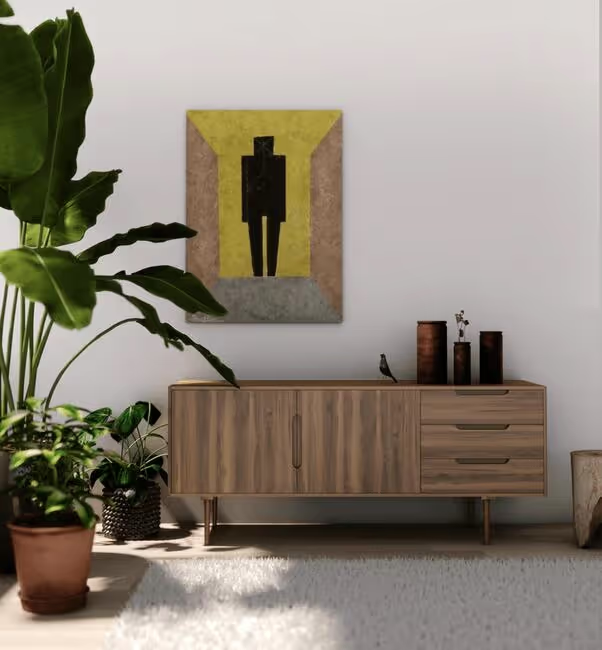Maybe you're looking to switch up the aesthetic of your home, or you've just moved and can't decide on which interior design style you'd like to go for. Well, the good news is, there's a style to fit everyone's needs and preferences.
We've rounded up the most popular interior design styles for 2025 and asked some professional designers to chime in and share their best advice, tips and tricks to creating a home you love.
Here are 30 different styles to inspire you to create your dream house and give you many design ideas.
- Minimalist Interior Design Style
- Modern Interior Design
- Industrial Interior Design
- Contemporary Interior Design
- Mid-Century Modern Interior Design
- Scandinavian Interior Design
- Bohemian Interior Design
- Transitional Interior Design
- Rustic Interior Design
- Art Deco Interior Design
- Glam Interior Design
- Hollywood Regency Interior Design
- Japanese Interior Design
- Traditional Interior Design
- French Country Interior Design
- Mediterranean Interior Design
- Retro Interior Design
- Modern Farmhouse Interior Design
- 20th Century Interior Design
- Victorian Interior Design
- Southwestern Interior Design
- Maximalist Interior Design
- Coastal Interior Design
- Zen Interior Design
- Eclectic Interior Design
- Scandifornian Interior Design
- 70s and 80s Interior Design
- Cottagecore
- Cluttercore
- Grandmillenial Style
30 Interior Design Styles for 2025
1. Minimalist Interior Design Style
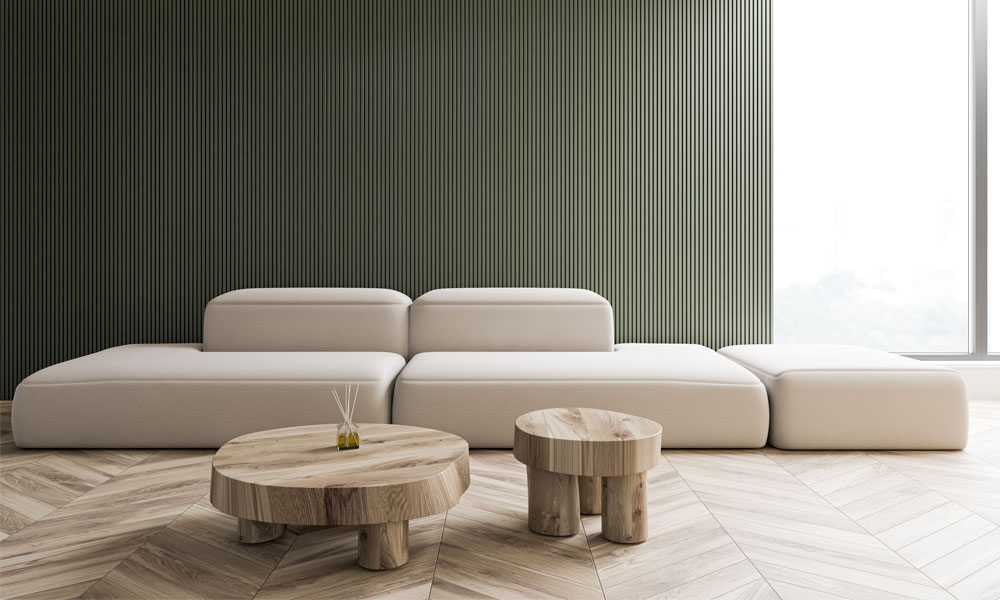
Minimalism can simply be described by the mantra "less is more."
It's a design style that came to prominence in the twentieth century and is known for its simplicity and "everything needs a place and a reason" approach.
Minimalist spaces will often combine an open floor, functional furniture pieces, lots of light with clean lines, natural tones, and a neutral color palette. It focuses on just a handful of furnishings' texture, color, and shape.
The use of clean lines and simple pieces can bring hints of Mid-Century Modern and Scandinavian design styles. And minimalism is as much about what's not there as what is — if you're embracing the minimalist style, you'll need to trim every unnecessary thing from your space and ensure everything has a purpose.
"When designing my own home, I wanted it to feel like my sanctuary – a space I can retreat to at the end of the day and feel relaxed, recharged, and at peace. I have a more minimal, neutral style in my personal home – it has a sense of quiet elegance. Each piece of furniture or decor was selected with purpose, ensuring it brings me joy and adds to that sanctuary," says Catherine Davin Co-Founder at Clairrow.
2. Modern Interior Design
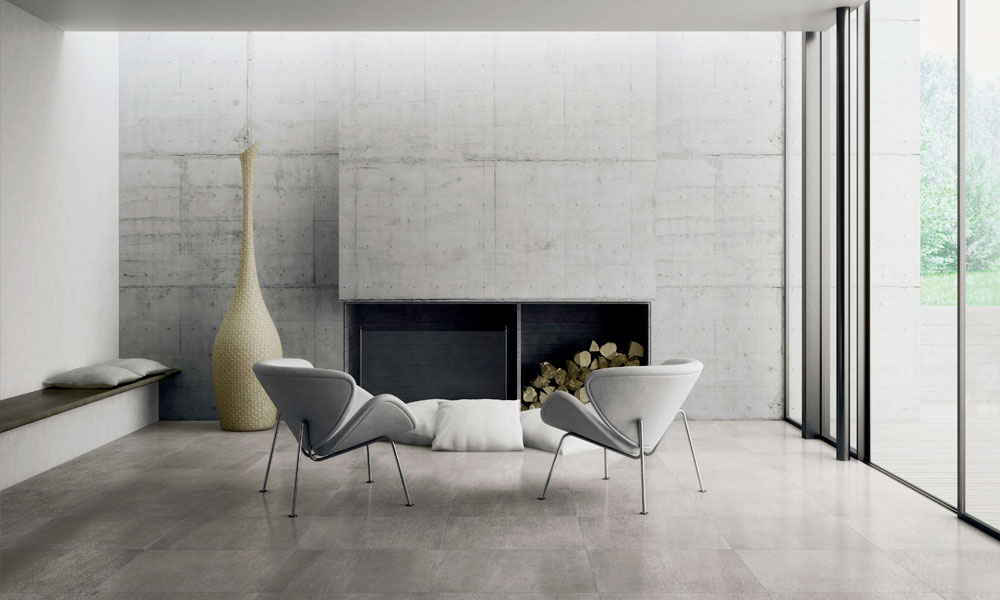
Characterized by an uncluttered and sleek approach to interior design that began in the late 19th century, modern interior design style reflects a fuss-free approach to living. It emphasizes industrial design with materials in their purest form.
"A modern interior style has been going strong for a few years now. It's a design approach that was inspired by the Modernist art movement and is now being taken in all sorts of creative directions as design professionals experiment with form and scale," Yoselin Castro, Mackenzie Collier Interiors.
Patterns are minimal, focusing on block colors, typically primary hues. It also features geometric patterns, clean lines, layering textiles and textures, and abstract spaces that look neutral and inviting yet casual.
If you're in search of stylish and functional bedroom furniture, don’t miss our latest post on minimalist bed frames - perfect for creating a clean, modern look.
"We see an emphasis on textures and patterns from textiles to decor. Everything from 'cozy' textured chairs and sofas to raised designs you can feel on decor surfaces," adds Sheva Knopfler, Co-Founder and Creative Director of Lights.com. "We are working to incorporate texture into our lighting with textured metals, pleated shades, and subtle ridge details on the base and backplates of our fixtures.
3. Industrial Interior Design
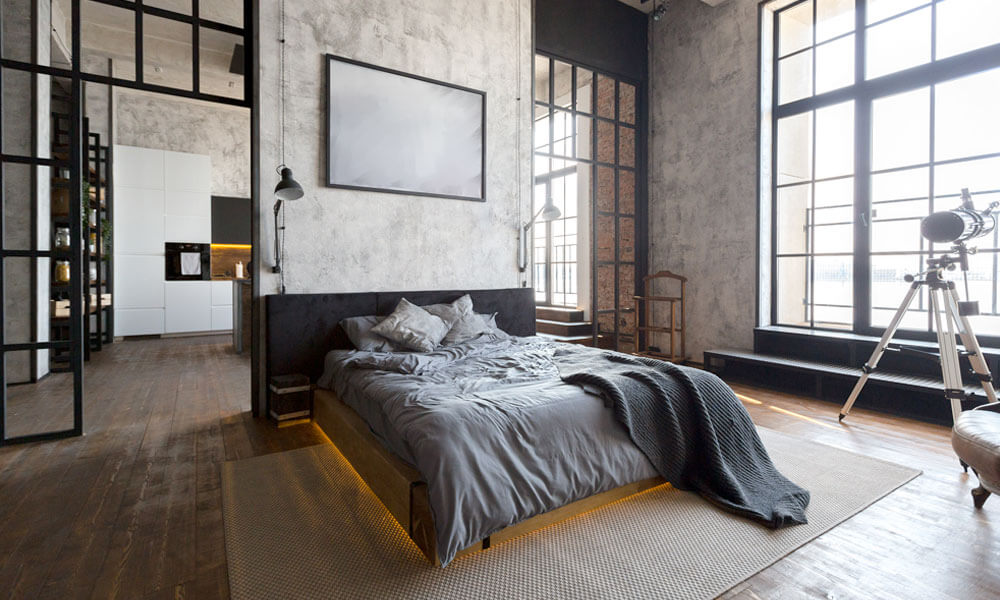
As the name suggests, industrial interior design is a contemporary style. It has an urban vibe with an emphasis on factory-like furnishings. Industrial design has a minimalist approach where the interior elements take center stage.
It celebrates functionality and efficiency. Industrial design is characterized by a neutral color pattern, raw wood, and unfinished metals with a touch of embossing.
A note of advice: We wouldn't recommend using industrial interior design styles for small houses as it calls for plenty of breathing room with oversized machinery-inspired pieces. However, you can quickly achieve this style in a single room like your bedroom by adding smaller raw metal decorative items in a nook here or there.
4. Contemporary Interior Design
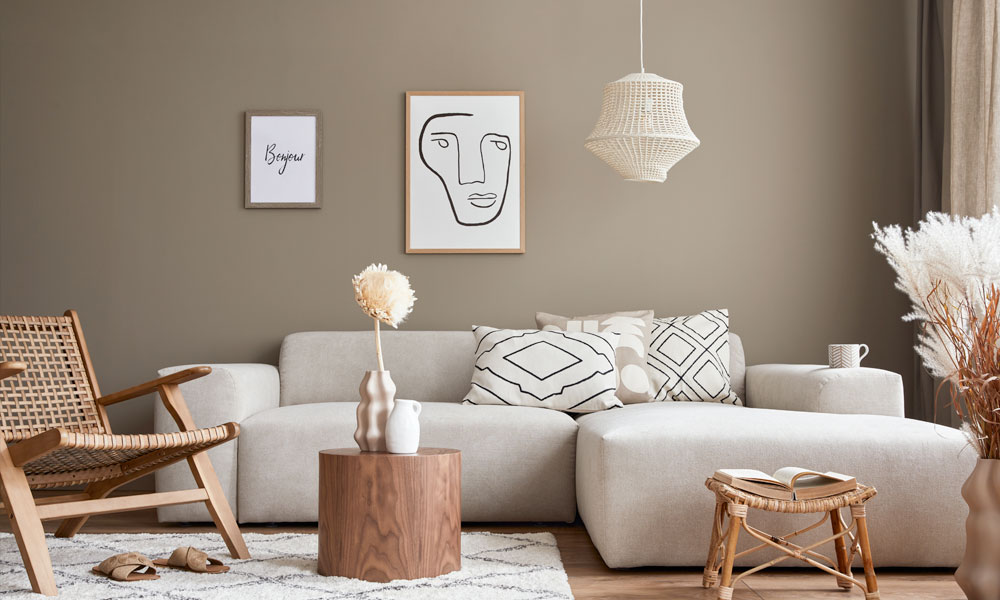
Historically, modern-style homes were considered to be cold and minimalist. But, this doesn't hold true in today's era – contemporary homes tend to be welcoming, warm, and cozy spaces.
"This style is rooted in focusing on lux material choices and near-monochromatic color choices that are rooted in warmer hues and a fundamental lack of contrast," says Maryana Grinshpun, Principal at Mammoth New York.
Creams and warm browns form the basis of this color palette and are punctuated by jewel tones like jades and mauves. This leads to natural pairings with bright metals like chrome as an accent.
Getting started with industrial interior design: "This aesthetic focuses on luxury, and a good way to start embracing it is by investing in a single piece that acts as the focal point of a room. Rugs and sofas are natural investment pieces for this and can be complemented with a sharp light fixture or a soft throw to feel more pulled together," adds Grinshpun.
5. Mid-Century Modern Interior Design
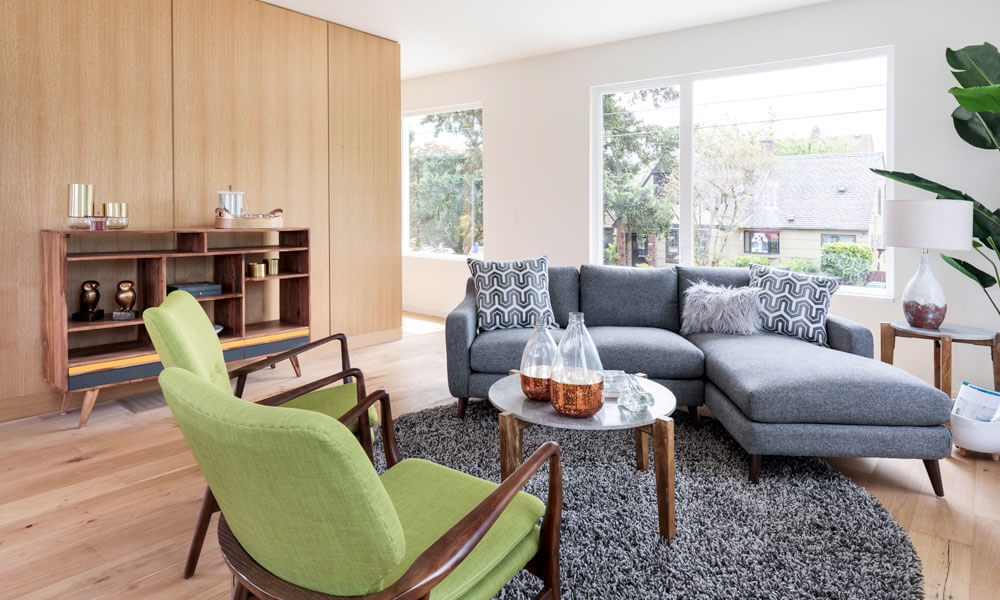
The Mid-Century Modern interior design style gained popularity after the Second World War. It's probably one of the most productive and creative interior design styles of all time. Although the mid-century modern interior design style borrows its charms from the 50s and 60s, it incorporates a clean yet very old-fashioned appeal.
This style of interior designing led to the International and Bauhaus movement. It is a contemporary design set apart by its crisp lines, vibrant colors, and combining outdoors with indoors.
The main characteristics of mid-century modern are simple silhouettes, soft fabrications, organic shapes, and functionality. It usually has a color pallet of yellow, brown, green, and orange.
The mid-century interior style can be used to quickly update your traditional design rooms. Also, the mid-century-inspired furnishings look great in almost every room. They create a rich, lavish yet diverse space.
6. Scandinavian Interior Design
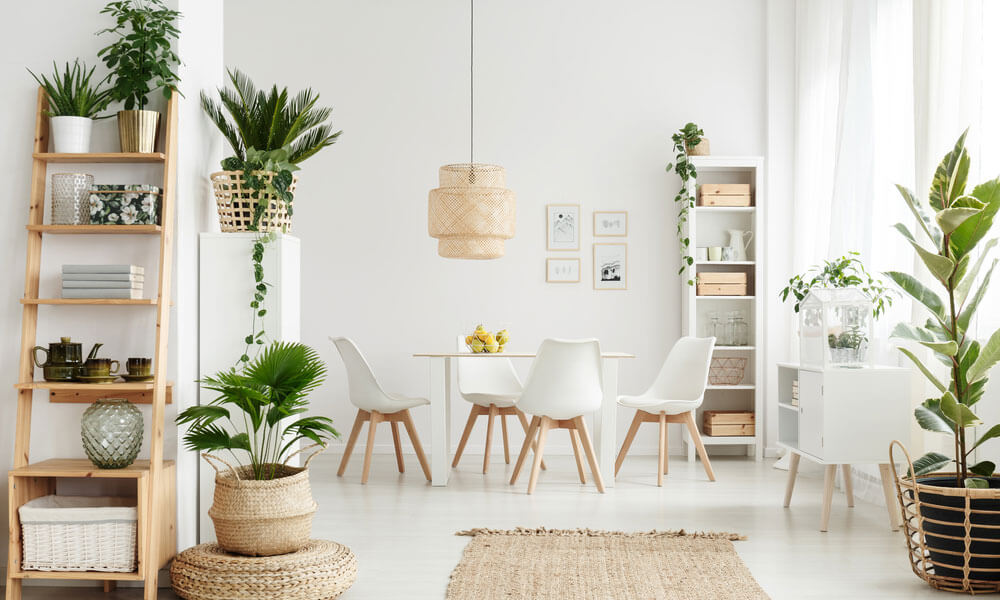
The Scandinavian design symbolizes efficiency, serene simplicity, and functionality. However, it also considers affordability.
According to interior designer Katja Lauterbach of Duett Design, some of the key characteristics of Scandinavian style and nordic design include focusing on function-driven space, minimalist pieces, bare ornamentation, natural materials, white walls, and not too much color.
"Hygge moments are created in many different ways - and requested often," says Lauterbach. "Clients are interested in natural materials, lighter woods and white walls - very calm and cozy, different layers of texture are key to making spaces work."
Hints of color alongside the natural/organic shades bring everything together in Scandinavian design — color is often introduced through a single textile element, such as a rug or a throw blanket. In addition to this, the contours and silhouettes are usually more rounded to create a cozier vibe. It even works with even the most straightforward arrangements and layouts.
7. Bohemian Interior Design
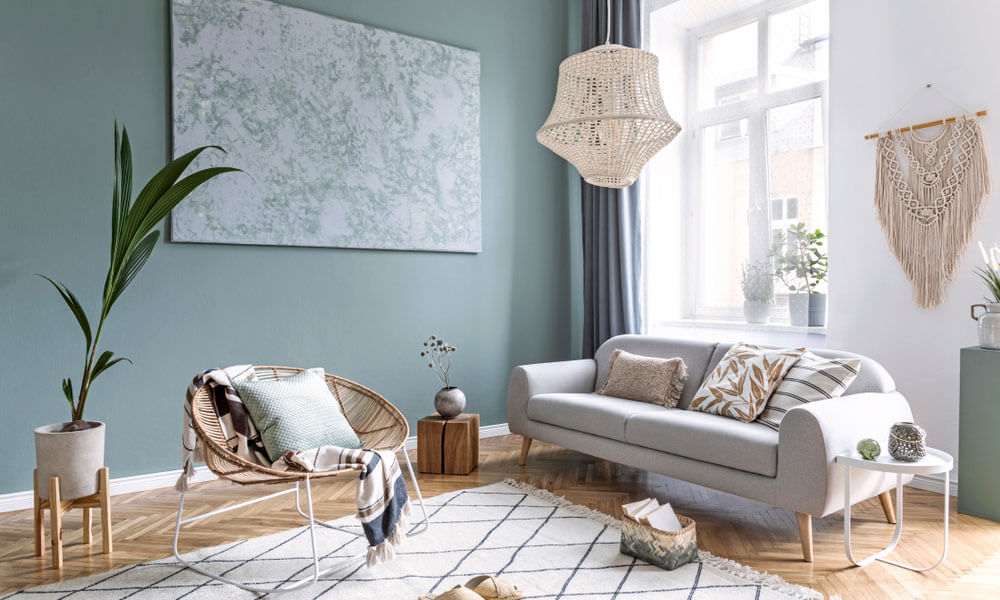
Bohemian, also known as 'boho-chic' or 'boho,' embraces a comfortable mix of vintage furnishings with glamorous crystals and beaded fabrications. The bohemian style reflects carefree and fuss-free freedom.
"If you fantasize about hiking around the world and getting lost in nature, boho décor is a fantastic fit for you. This is because travelers brought back boho prints from India and the Far East in the 1960s and 1970s, and they became popular in the 1960s and 1970s," says Paige Anderson, an interior design architect at Nitido Design. "Bohemian décor will bring the wandering lifestyle into your house, whether you've toured the world or only dreamt about it."
Pro tip: "The nicest part about boho décor is that there are no rules at all! There are no color palettes, texture limitations, or anything like that! So if you want a lot of prints, a lot of textures, and just about anything under the sun, a boho-themed house is a perfect place for you," says Anderson. "In fact, when it comes to bohemian, more is usually better. So go ahead and throw everything up on your walls and revel in the haphazard yet attractive look."
8. Transitional Interior Design
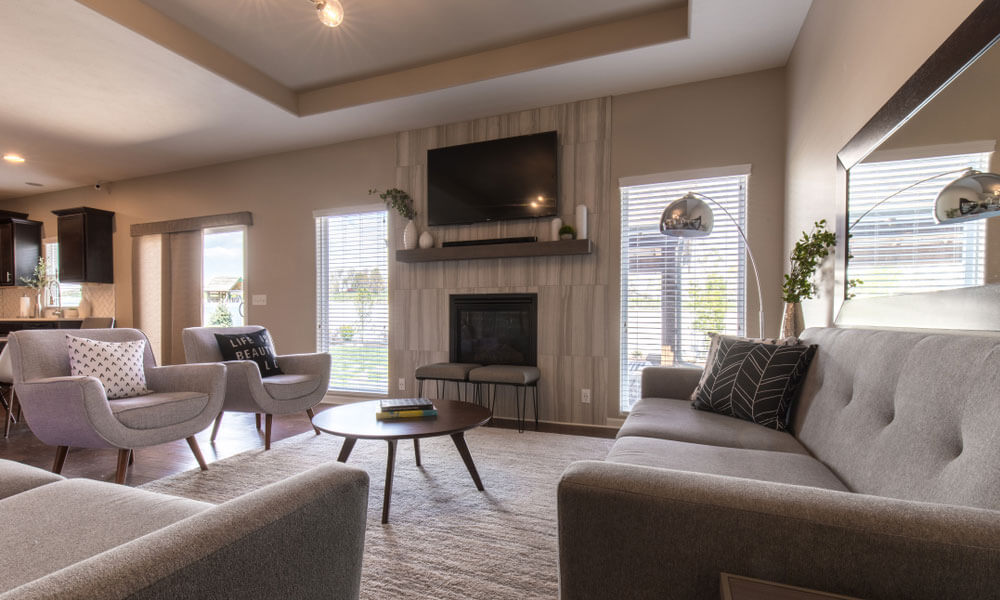
Transitional interior design doesn't belong to one particular style. Instead, it blends multiple styles together, mixing traditional design with newer styles and contemporary and modern design elements.
"Transitional design will continue to be popular for homeowners," says interior designer Maggie Stephens. "Expect to see traditional elements mixed with clean lines and contemporary upholstery. Light color schemes, neutrals, and natural wood tones feature strongly in this style."
The transitional style features an unexpected mix without making the space crowded. It features structure, solid wood furniture, and oversized decorative pieces focusing on comfort, warmth, and relaxation.
9. Rustic Interior Design
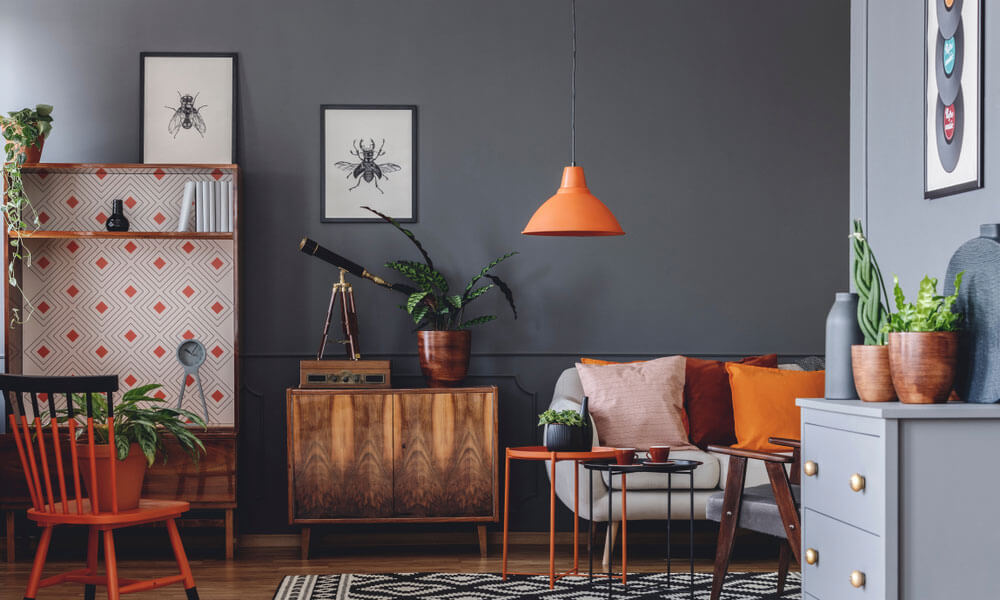
The rustic style emphasizes natural and weathered finishes, raw wood, leather, and stone. It takes inspiration from outdoor and industrial interior design. Yet, it has an irresistible charm that can work well in various spaces, from a family country home to a city center apartment.
It provides a perfect combination of practicality, functionality, comfort, and fuss-free designs creating a warm interior with rustic natural materials.
We love how a rustic room features a mix of statement-making furnishings with industrial-inspired pendants and leather chairs. The neutral color tones complement the hand-crafted wood.
10. Art Deco Interior Design
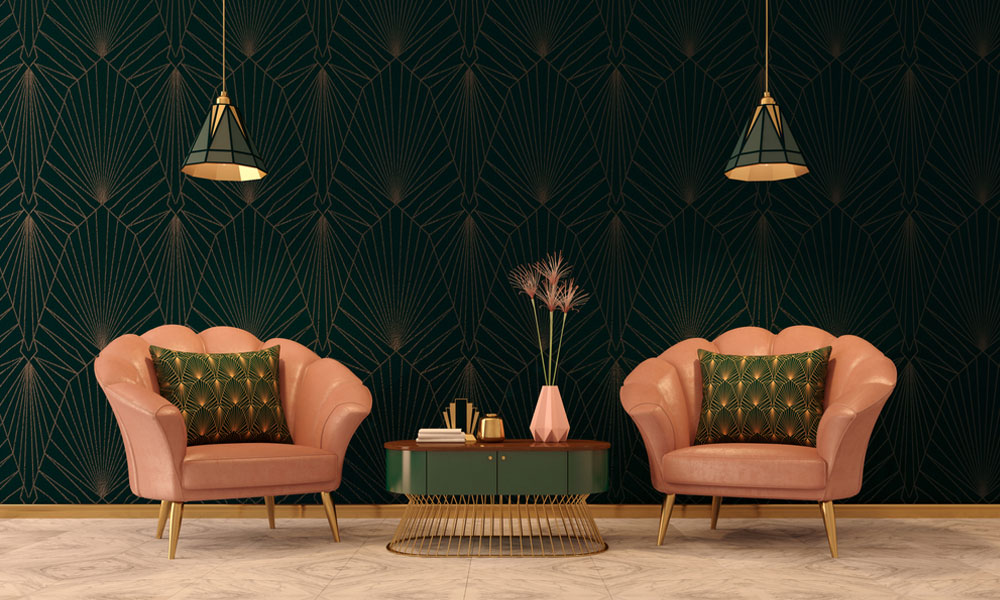
The art deco style features bold yet elegant elements that blend glamour and elegance with furnishings. It has origins from the post-war era of America and Europe, born in the 1920s.
At its heart, it's a sensual exploration of symmetry, lines, and geometry. It features angular patterns, bold curves, layered designs using lacquered wood, glossy paint, and mirrored pieces. Furthermore, shiny brass and chrome fixtures add a touch of elegance.
If your taste bends towards glamorous yet sleek style, this throwback and eclectic style is made for you.
11. Glam Interior Design
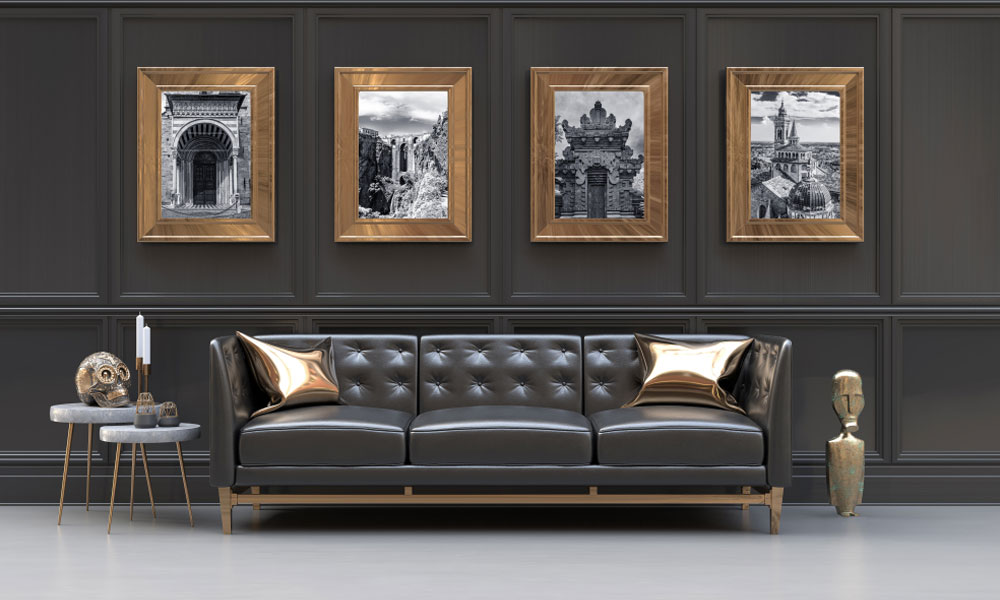
The glam interior style combines a fashionable look with lavish fabrics, glittering metals, and sparkly accessories. It aims at creating elegant and refined charm in your house.
It's pretty extravagant but still manages to create a balance of functionality and lavishness. It incorporates tufted furniture, embellished upholstery details, and gold or brass features, which are must-haves when aiming for a glam-inspired living room.
12. Hollywood Regency Interior Design
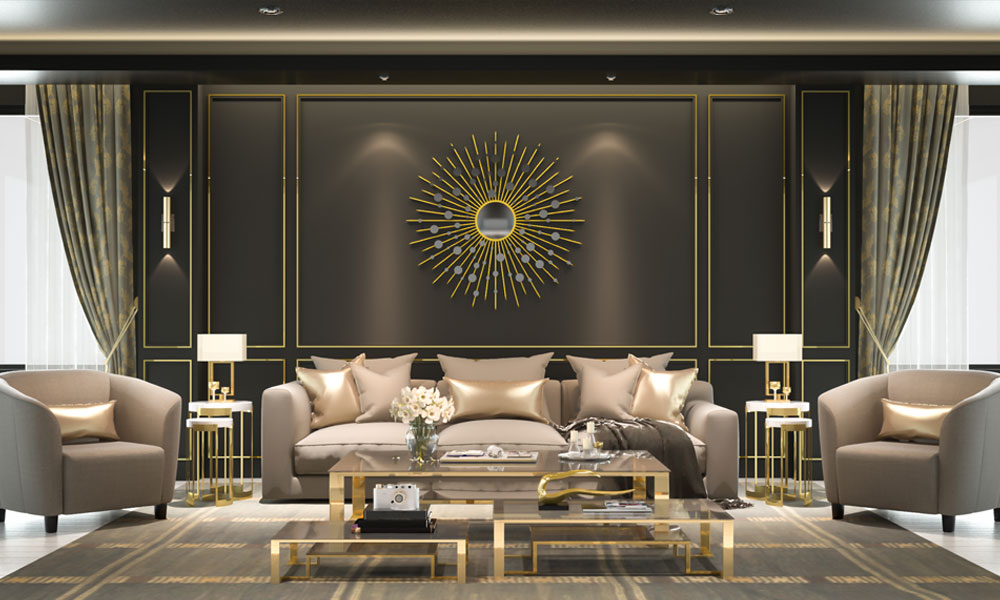
Hollywood Regency is one of the most timeless designs ever. It is quite fun at the same time. It charmingly balances Art-Deco profiles with high-polished glamour. This style aims at bringing back the glamour of Hollywood's golden age.
It combines French furnishings, vibrant color, and metallic gold and brass finishes. Also, it features a rich carpet, glamorous mirrors, chandeliers, and many shiny surfaces. In short, it recreates the lavish décor of major historical film stars.
This design is an exciting blend of textures, styles, and trends. Moreover, it exhibits striking, glamorous, and comfortable furnishings.
13. Japanese Interior Design
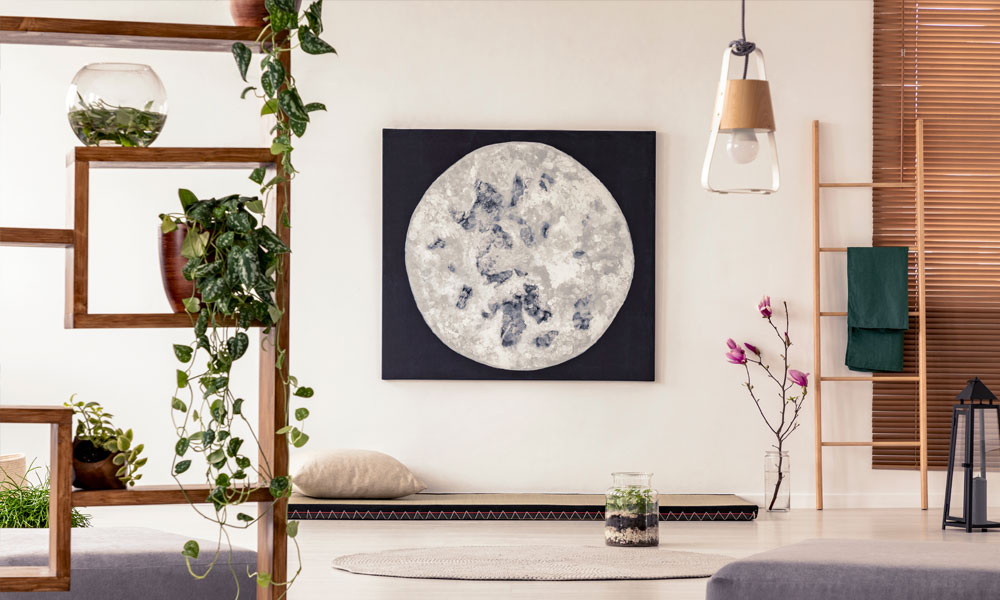
The Japanese style brings a kind of traditional minimalism to interior design. Japanese-style homes have abundant natural materials and ikebanas (flower arrangements). Moreover, they feature properly structured spaces with minimal and simple furniture.
The color palette consists of milky, cream, and light beige. This style loves to create a peaceful and relaxing atmosphere by incorporating different lights. The modern ceiling lights under Shoji are covered with paper, creating a diffused effect. There is heavy use of bamboo tables and tatami lamps - Japanese-style home décor follows the spirit of Zen philosophy.
14. Traditional Interior Design
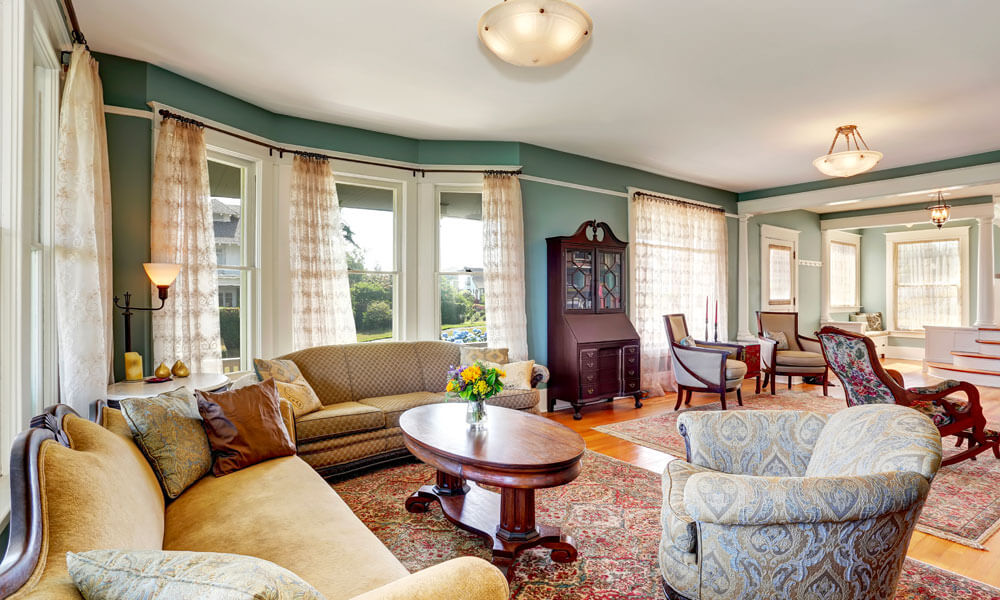
"Traditional design has an air of refinement and sophistication about it. Traditional rooms have an appearance based on ideas from the 18th and 19th centuries," says Paige Anderson. "Finely made and eloquently finished wood-tone pieces characterize this kind of furniture. Adornments should be opulent and opulent. Soft curves, furniture, textiles, details, warm hues, and moldings are all significant features of a traditional style," she adds.
The Traditional interior design style is easily recognizable by the winged back chairs, claw-footed tables, and a hint of French Country style.
"The Traditional style is defined by curvy lines, warmer color palettes, and a bit of (tasteful!) ornamentation. Think of a cozy sofa or wingback chair in a rich pattern and texture, a four-poster bed with luxurious linens, or a vintage-inspired chandelier. Expect a fresh, updated take on the traditional style, though, with a thoughtful mix of both modern lines and traditional silhouettes," adds Alexandra Davin, Co-Founder at Clairrow.
15. French Country Interior Design
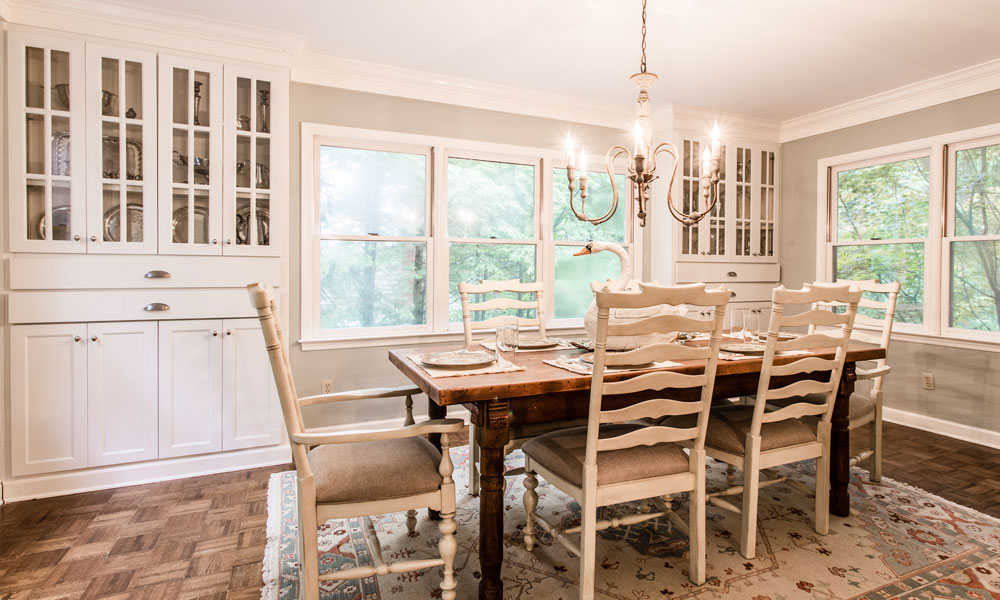
French Country is a cross between French and farmhouse styles. It blends shabby chic elements with sophisticated charm. It's a popular style because it offers casual elegance and comfort that's never out of date.
Key design features of this interior decorating style include functional yet minimal furniture pieces like coffee tables and dining tables, softly patterned fabrics, muted color hues, distressed vintage accessories, and lots of wood and other natural materials.
You sometimes hear French Country called provincial style, but provincial style tends to have a more formal aesthetic.
16. Mediterranean Interior Design
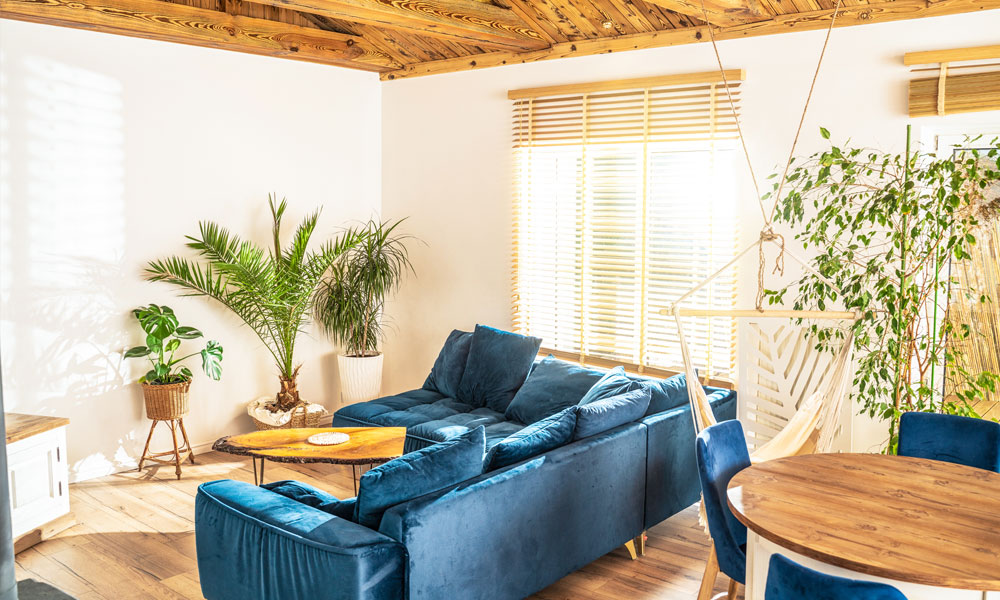
As the name suggests, it takes inspiration and aesthetics from Mediterranean and Southern European countries such as Greece, Spain, and Portugal. It gives the space a unique and stylish character while keeping everything minimal and is perfect for indoor-outdoor living.
Mediterranean design is known for its fresh appearance, cozy vibe, and natural materials like terracotta, wood, stone, and cotton. It tends to take advantage of plenty of natural light and uses warm tones in its color scheme. Architecture can play a role in this style using exposed beams and natural stone walls, often paired with tile or hardwood floors.
This style perfectly channelizes warm summer vibes with a minimalist-chic approach.
17. Retro Interior Design
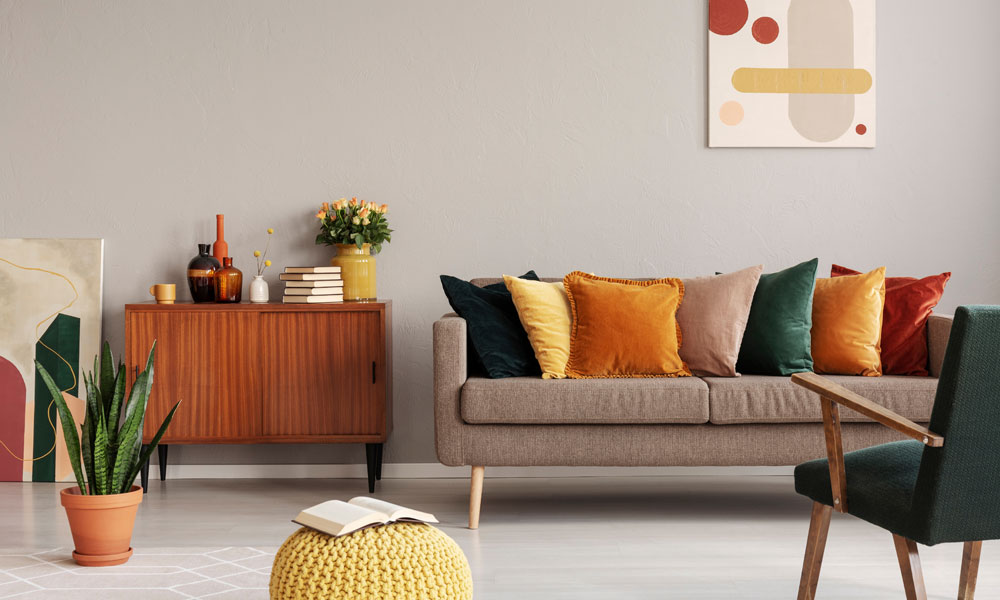
The retro interior design style is an electric mix of old style with modern materials and finishes. It embraces a mixture of contrasting colors and shapes, but the unbalanced ratio adds to the house's character.
A diverse color palette of bright neutrals with oversized furnishings such as footstools, bean bags, and hanging pod chairs makes this style different. Additionally, the retro interior design is a blast from the past and perfect for passionate individuals with unique decorating styles.
Take a risk, break the rules and sing to your own tune when it comes to retro designing.
18. Modern Farmhouse Interior Design
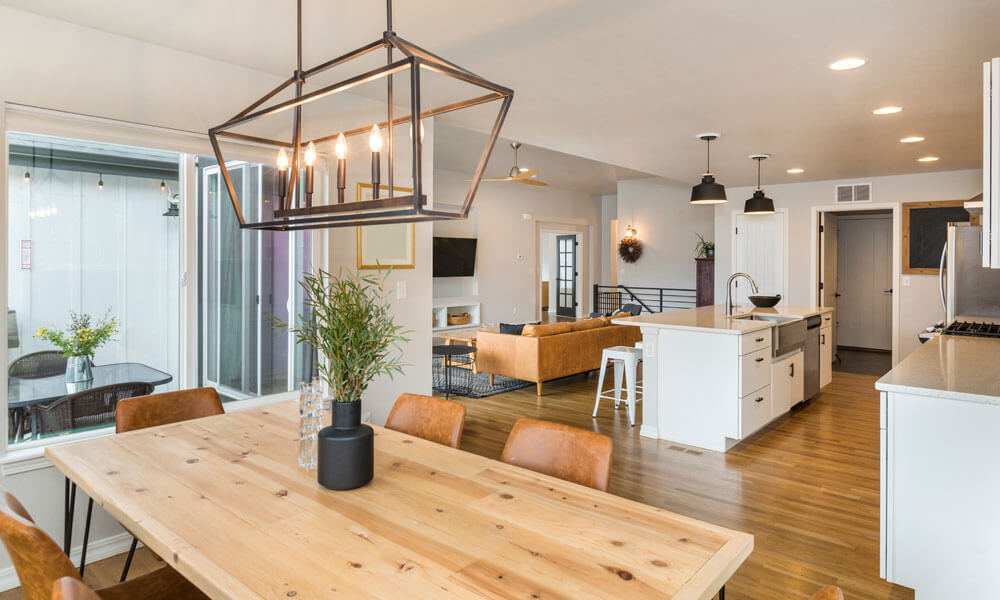
This style is among America's top popular contemporary design trends
"Modern farmhouse interior design blends the rustic elements that we love so much but combines it with contemporary modern elements. The blending of two interior design themes tends to fit people better because people are not one-dimensional," says Andra DelMonico, Lead Interior Designer at Trendey.
The soothing nostalgic feelings with traditional décor make this style so popular. It focuses on practical repurposed furniture and natural materials, adding a rustic, vintage charm. It has a warm and nostalgic appeal of cozy farmhouses. Modern farmhouse spaces feel uncluttered with a balanced mix of contemporary and antique décor.
19. 20th Century Interior Design
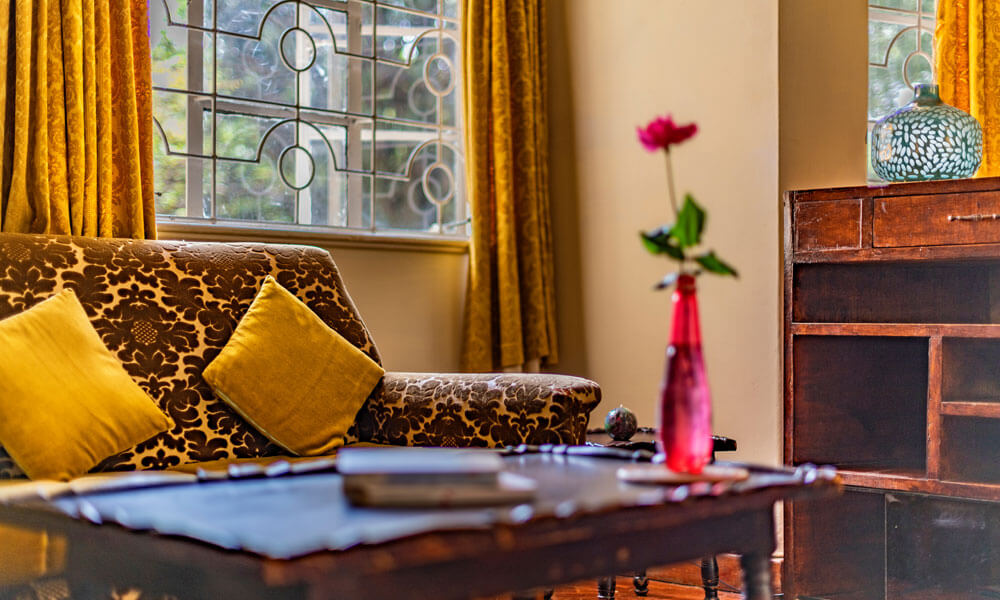
The 20th-century interior marks a significant turning point in the history of design. It takes you on a journey into the past, combining historical styles with revitalization.
The main characteristics of this style are geometric and elongated motifs, stylized flowers, and subtle tones of black and white with splashes of contrasting colors like silver and gold.
This style combines classic architecture, furniture, and interior design and is suitable for modern life. As a matter of fact, it's proof that your grandparents were just fashionable as you imagine, creating iconic, timeless homes.
20. Victorian Interior Design
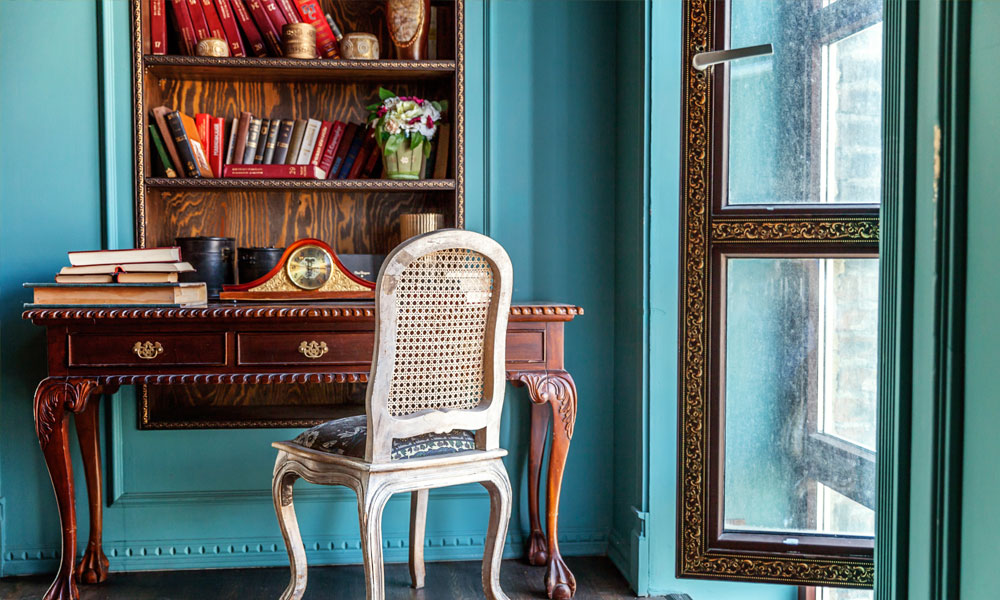
The Victorian interior design style features lavish décor and Victorian-era elements. It incorporates a mix of historical styles, decorative ironwork, and old-fashioned decoration.
Victorian rooms have luxurious furnishings, patterned or floral wallpaper, sentimental pictures, embroideries framed on walls, and rich colors. It includes carved wooden pieces with a fireplace mantle and marble furnishings to complete the look. Of course, the easiest way to add Victorian character to your home is by reusing old architecture.
It uses darker ruby red, deep brown, burgundy, navy blue, and forest green. The era is defined by elegant decoration pieces such as button-back armchairs, ottomans, and chaise lounges. Moreover, the heavy use of candles and light fixtures takes you on a ride to the Victorian era.
21. Southwestern Interior Design
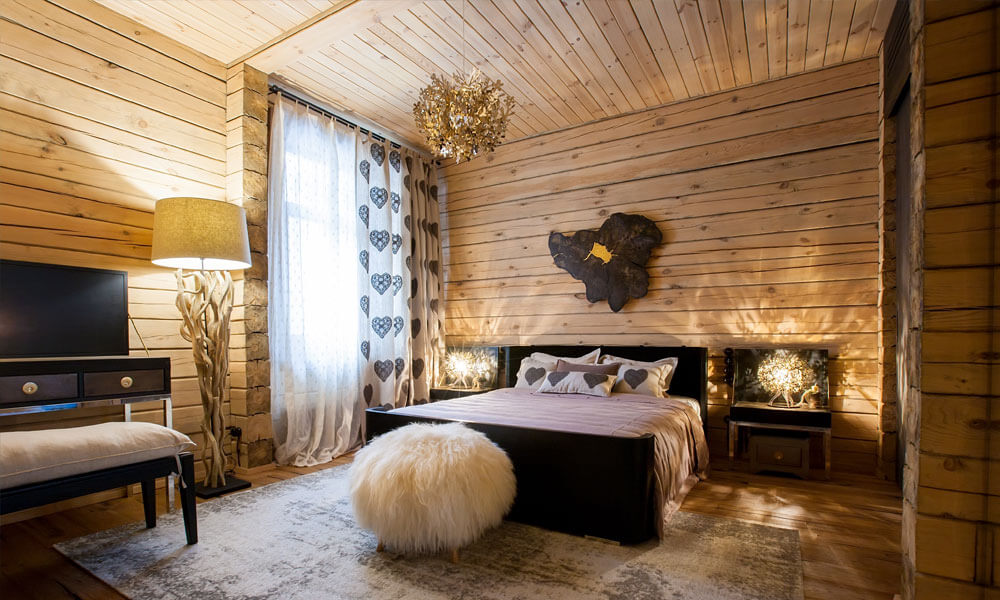
Southwestern interior design style gathers inspiration from Spanish textiles, ironwork, beige palettes, and nature. It creates a subtle rustic and cozy look and uses bold prints and patterns.
It has heavy use of leather, suede, and other textures. The primary colors are rust, terracotta, and cactus-green, made even more prominent by bulky furnishings. It creates a rustic charm by blending organic materials and earthy pastel colors representing sunset in a desert.
Southwestern style can add character to any room, making it perfect for the kitchen and bathroom.
22. Maximalist Interior Design
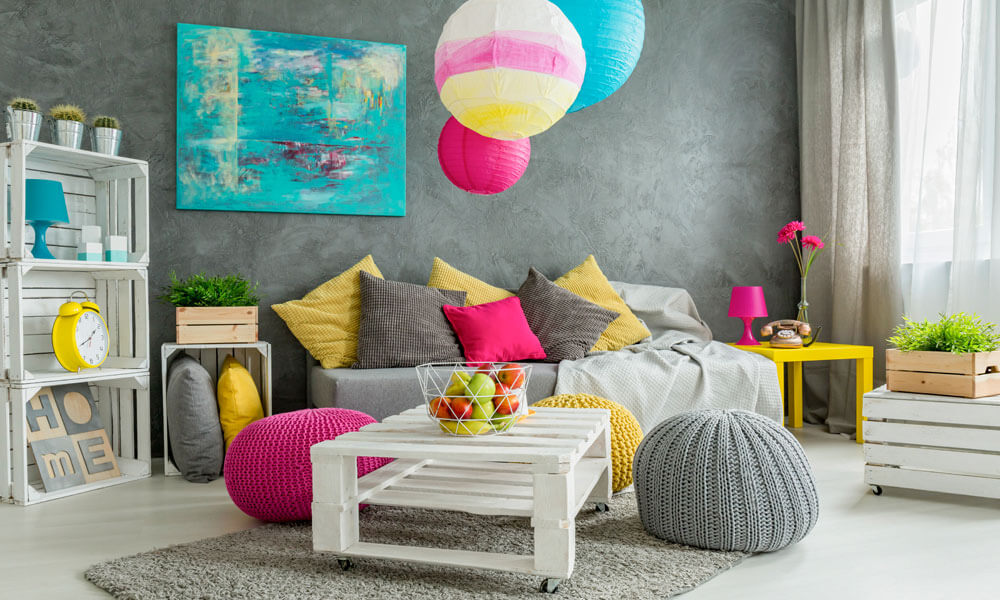
Maximalist means more of everything – more fabrics, accessories, and color. You can rock the maximalist décor trend by layering patterns having vibrant colors. All this creates a real sense of playfulness.
This design trend is loud, bold, and busy, often featuring mixed patterns and materials tied together with a common color scheme. A maximalist home will also display collections of the owner’s favorite possessions or artworks, but unlike cluttercore, these will be curated and sectioned off for a more refined aesthetic.
"The hallmark of maximalism is just that, rich, layered patterns and colors, design in excess, but with intention," says Mark Culter, co-founder of CutlerSchulze, an Interior Design firm based in Los Angeles. Not to be confused with just clutter, maximalist homes are like a fantastic treasure hunt, filled with detail and unexpected relationships between different elements," he adds.
To keep your décor from looking too random and overcrowded, find a few common color patterns and repeat them throughout the room. And remember, books are a must-have. After all, the maximalist style is a book lover's dream.
If colors and patterns make you happy, then maximalist could be the perfect decorating style for you. Head to your local flea market and start creating your maximalist living space today.
23. Coastal Interior Design
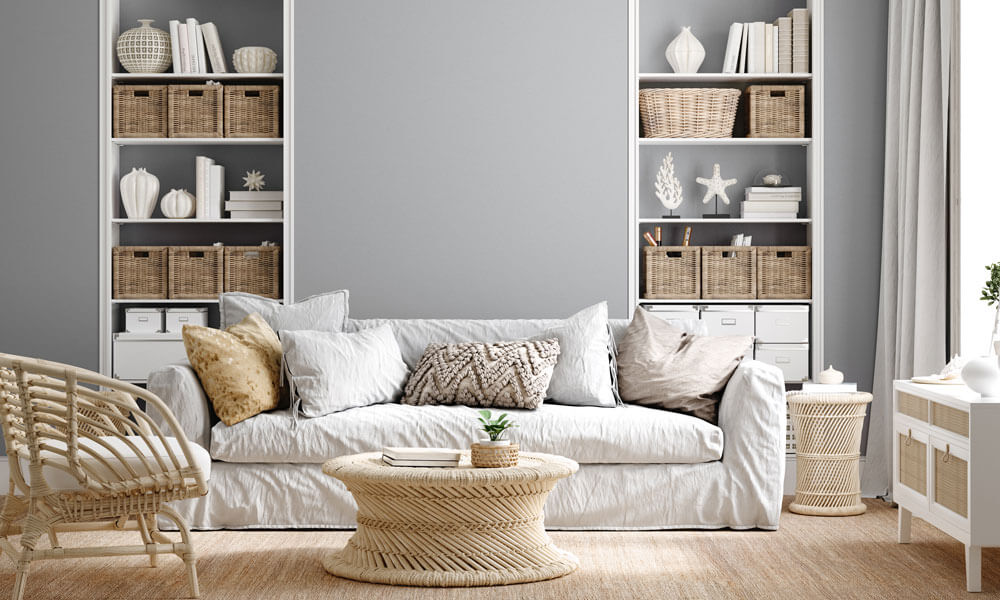
Fresh, relaxed, and excitingly versatile, the coastal interior design style takes inspiration from organic oceanic materials. It aims at creating a sun-kissed ambiance by using natural light.
The contrast of white and blue is perfect for achieving this style. This style gives the freedom to go completely literal with the theme and use everything from seashells to ropes and marine icons to build a coastal room.
Key colors include turquoise, aqua, teal, and myriad shades of blue.
24. Zen Interior Design
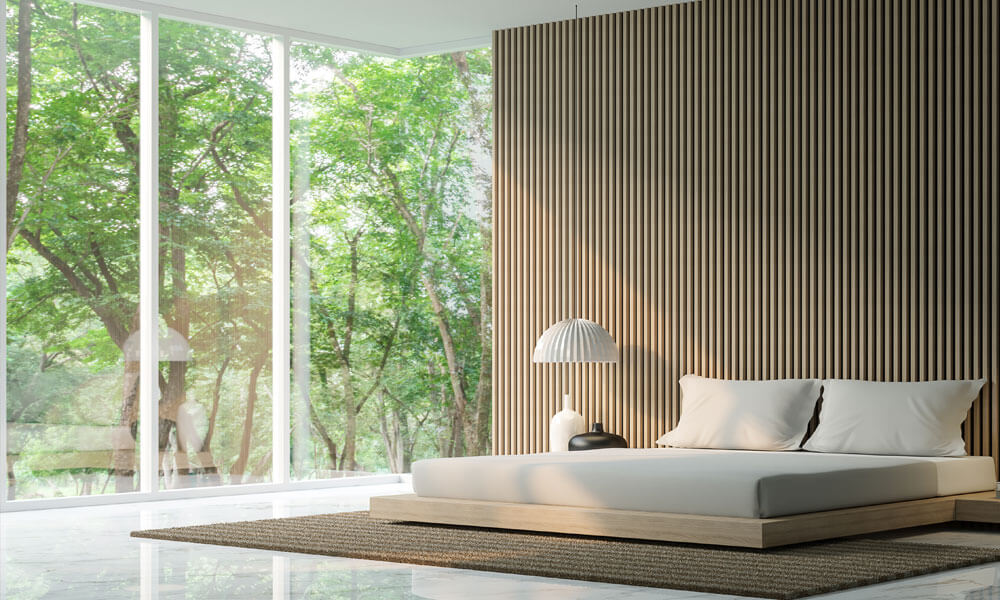
Originating in Japan, Zen means meditation, and it has become an increasingly popular style. It focuses on creating harmony, balance, and calmness via minimalist design approaches.
A Zen-inspired design is about earthy colors (beige, white, grey) and natural fabrics that create calmness. It creates harmony and visual continuity with textured textiles. It plays with diversity by breaking the monotony with bright pops of color through decorative pieces.
Pay attention to simplicity over luxuriousness. This style highlights the natural elements trying to create a focal point with furniture. Remember: Less is more when it comes to Zen interior design styles. It avoids clutters of decorations.
25. Eclectic Interior Design
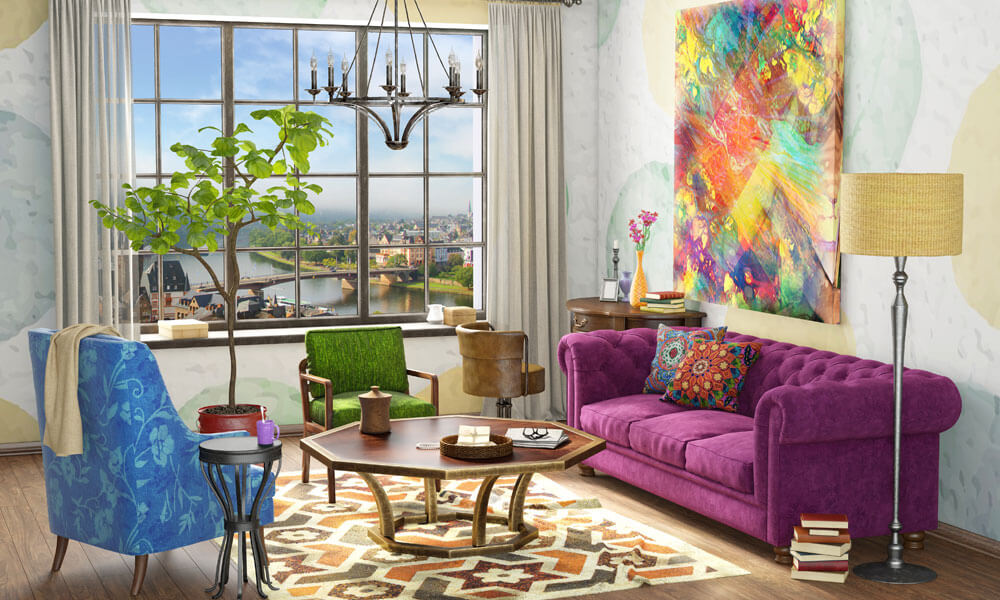
Eclectic interior design is a style that artfully blends multiple design elements into a single space. It involves a mix of décor, bright color patterns, bold textures, and antique details.
The color palette varies significantly, from natural hues to bright colors. It includes a multitude of fabrics, patterns, and textures. The mash-up of styles isn't random; instead, it creates consistency by bringing contrasting elements together. It brings alive individuality yet harmonizes the diverse layering of textile to create a rhythm.
26. Scandifornian Interior Design
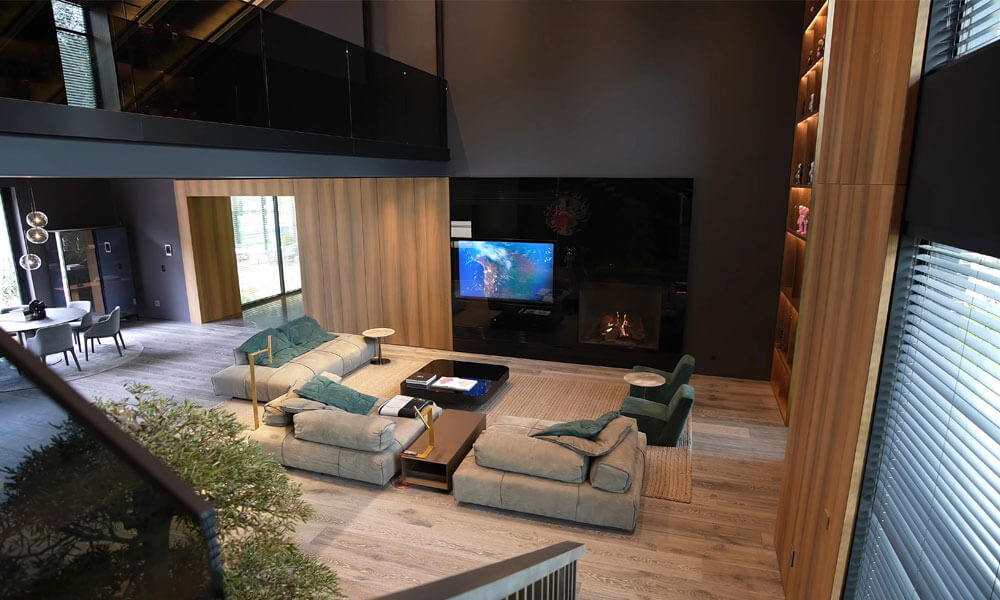
Clean lines and sleek silhouettes of furnishings mixed with warm color hues and fabrics create Scandifornian homes worthy of getting stuck for months.
It is characterized by simplistic vibes and combining modern décor items with antique elements. This creates a calming and light space, hence called minimal bohemian.
It features a black color palette with boho-vibes, cluttered charm, and blonde wood. You'll often see classic mid-century details in Scandifornian houses —rock fireplaces, wood paneling, oversized windows, and open living spaces. It's a style that never goes out of trend.
27. 70s and 80s Interior Design
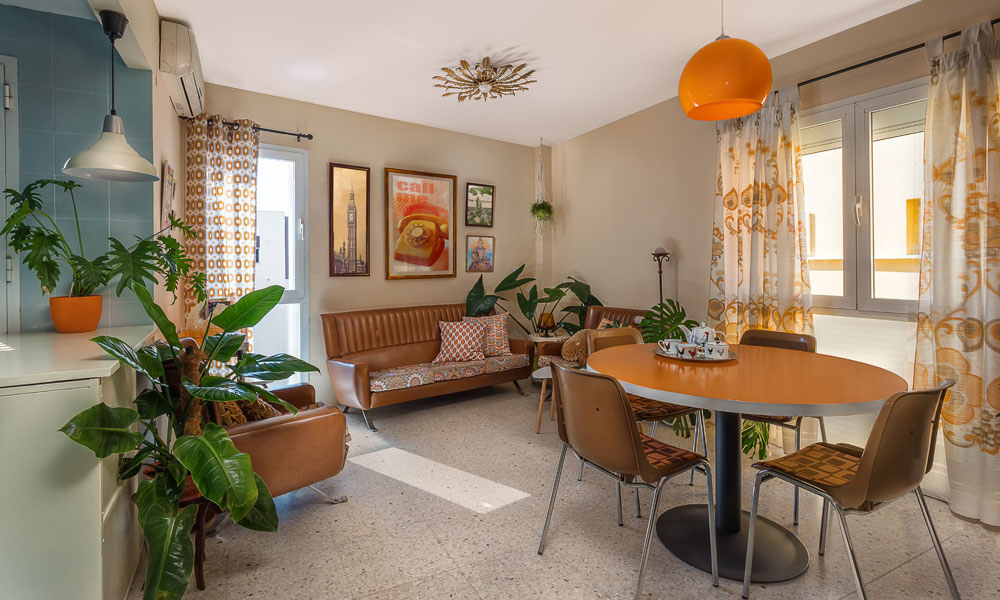
When you think of 70s and 80s design styles, you likely think wood paneling, bright colors, bold patterns, the use of natural materials and texture (exposed bricks and textured walls)
"70's and 80's style continues to be a strong trend. The softly curved silhouette is becoming more and more popular, especially at all the big box furniture stores," says Mark Cutler. "70's and 80's style has soft, rounded edges, lots of boucle, brass trim, and shaggy fabrics. The colors are deep pastels and white, with geometric patterns."
28. Cottagecore
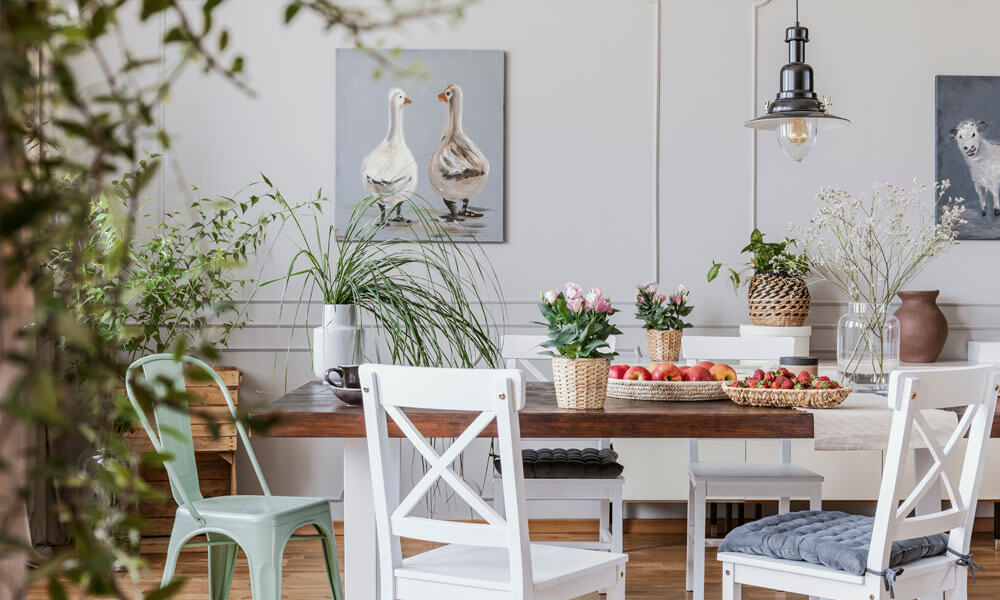
"Cottagecore originated from the idea of a slowed-down rural life, where one is more harmonious with nature and romanticizes the simple things in life," says Lindsey Jamison, lead designer and partner of HGTV 2021 Designer of the Year winning-firm, Rumor Designs.
The cottagecore aesthetic has grown increasing popular in recent years. “It celebrates a romanticized, self-sufficient lifestyle often found in rural or farm settings, where you’ll find handmade decor; soft and easy textiles; delicate floral prints; and vintage-inspired pieces in furniture, artwork, and accessories," adds Amber Dunford, Style Director at Overstock.com.
30. Cluttercore
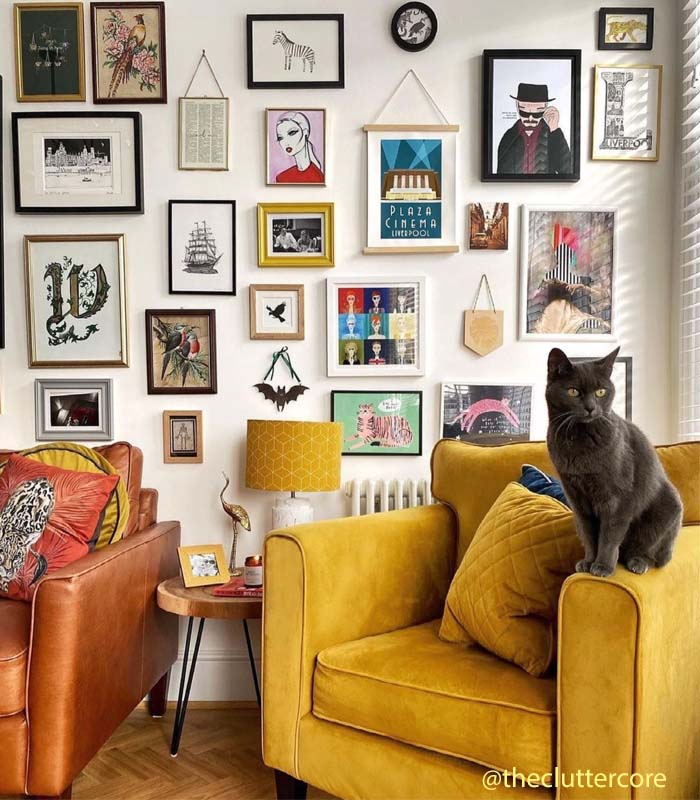
Cluttercore is the celebration of things that are important to you, with a focus on displaying your much-loved items rather than storing them away. This often leads to walls crammed full of pictures, postcards, or open shelves, making your possessions an unforgotten part of your life which you can easily tap into at any time.
30. Grandmillenial Style
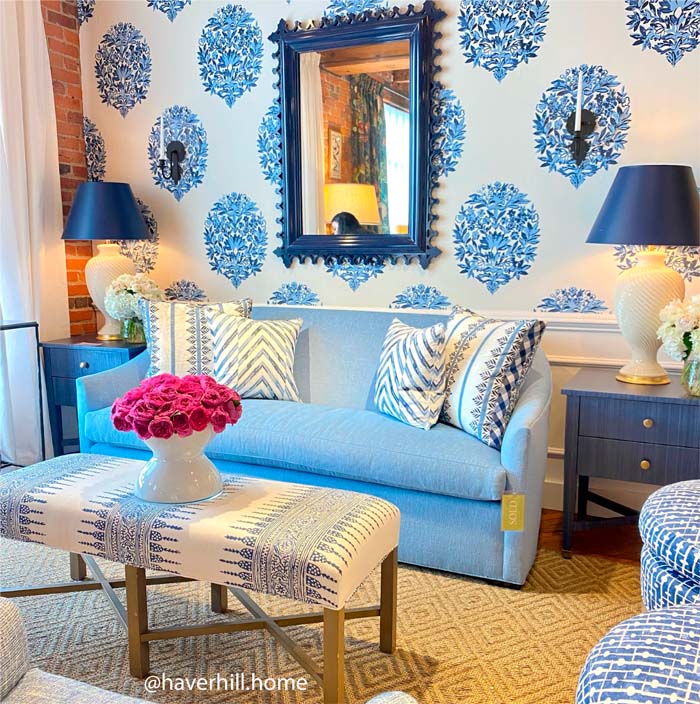
Grandmillenial style of home decor is a feast of nostalgia, featuring busy wallpapers, patterned textiles, and what might be considered “grandmother’s furniture”. If you enjoy floral prints, tea sets, and upholstery, this could be the style for you.


